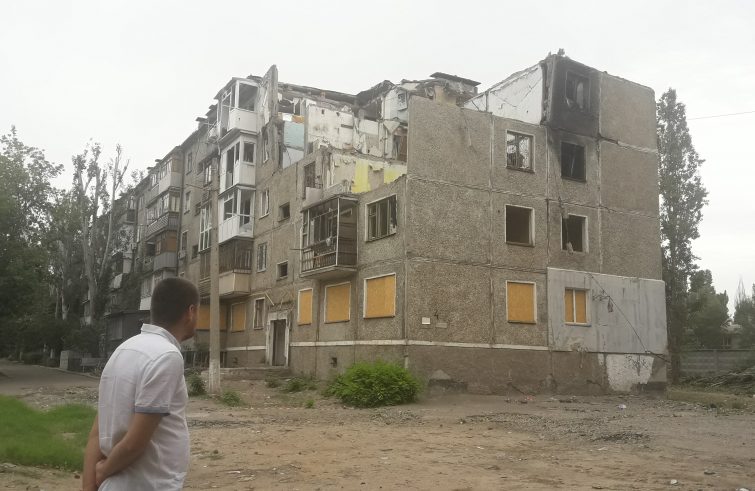
Mrs Tamara, holding a small broom, continues to clean the small walkway outside her house, even though the surrounding area is a pile of rubble, dust and ruins. A bomb fell near her home two days ago. Around four o’clock in the afternoon. “I was here when it happened. All of a sudden I saw the windows and doors blown apart.” Her T-shirt is still stained with blood and she has two bandages: one on her head, the other on her leg. Tamara has deep blue eyes. Those of her husband are full of tears. Their next-door neighbour died under the rubble and so did a man who was walking along the street.
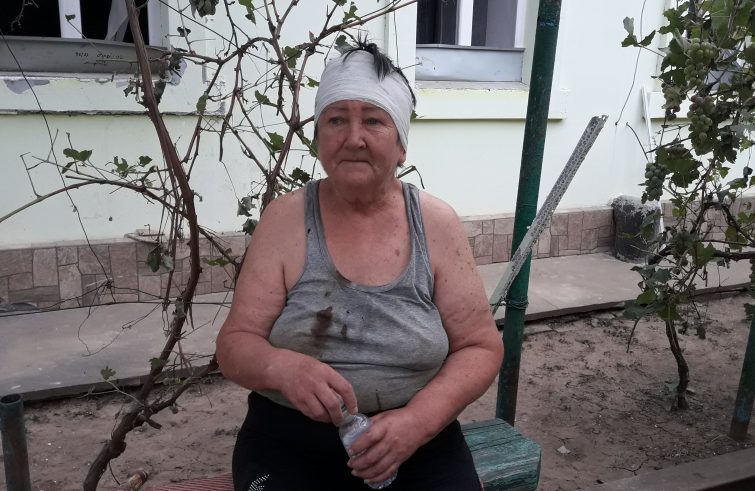 Life in Mykolaiv is divided into moments of normality and sudden attacks. Here, everyone knows they could be struck by shelling at any moment, even at home, even while walking down the street. Maskym Kovalenko, member of Mykolaiv’s city council, said: “I am not worried about the future. Here we live by the day and hold out against attacks.” Five per cent of the region of Mykolaiv is under Russian occupation. Kherson is only 50 kilometres away, while the warfront, where fighting is raging, is only ten kilometres away. Incessant explosions, heard day and night, indicate that the coming hours will be decisive for this part of Ukraine, as Ukrainian forces are fighting to recapture the city of Kherson. We see a tank on a street of Mykolaiv. A military ambulance with a Ukrainian soldier inside runs past, escorted by police vehicles. All of a sudden, a loud sound pierces the sky over Mykolaiv. People raise their heads, stare at each other apprehensively and with alarm. Finally they breathe a sigh of relief. “The Russian forces have many soldiers and a lot of equipment, but we have the ability to resist,” said an army officer deployed on Kherson’s battlefront.
Life in Mykolaiv is divided into moments of normality and sudden attacks. Here, everyone knows they could be struck by shelling at any moment, even at home, even while walking down the street. Maskym Kovalenko, member of Mykolaiv’s city council, said: “I am not worried about the future. Here we live by the day and hold out against attacks.” Five per cent of the region of Mykolaiv is under Russian occupation. Kherson is only 50 kilometres away, while the warfront, where fighting is raging, is only ten kilometres away. Incessant explosions, heard day and night, indicate that the coming hours will be decisive for this part of Ukraine, as Ukrainian forces are fighting to recapture the city of Kherson. We see a tank on a street of Mykolaiv. A military ambulance with a Ukrainian soldier inside runs past, escorted by police vehicles. All of a sudden, a loud sound pierces the sky over Mykolaiv. People raise their heads, stare at each other apprehensively and with alarm. Finally they breathe a sigh of relief. “The Russian forces have many soldiers and a lot of equipment, but we have the ability to resist,” said an army officer deployed on Kherson’s battlefront.
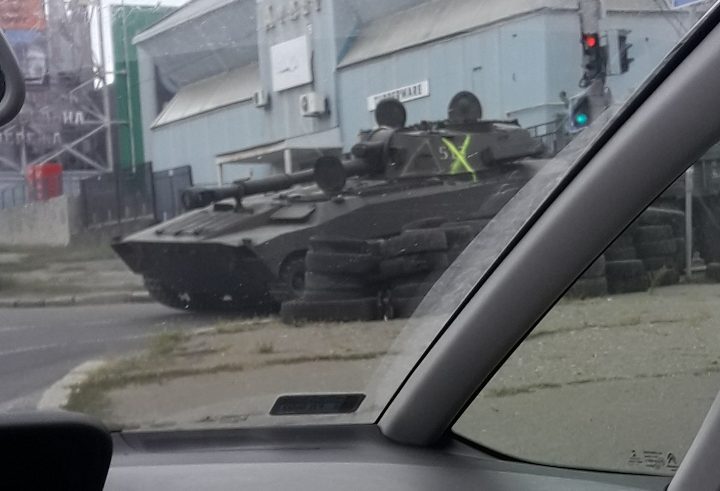 Walking around Mykolaiv means retracing the wounds of this war. A total of 100 buildings were hit throughout the city, with some 120 civilian casualties since the beginning of the Russian invasion. The most dangerous sites are those next to or in the vicinity of sensitive locations, deemed to be nerve centres or ammunitions depots by the Russians. Unfortunately, however, airstrikes are not always precise and houses, hotels, office buildings and a gas station were targeted, perhaps accidentally. The premises of Mykolaiv University’s Faculty of Pedagogy was also bombed a fortnight ago, and the adjacent student campus turned to rubble. Despite having been hit by two missiles, the Reikartz Hotel overlooking the seafront still has wireless access. Sixty per cent of the population has fled. Some 200,000 people are still left in the city. Most of them are elderly men and women, many of them disabled and not self-sufficient. The offices are all closed. Only a few supermarkets, pharmacies and banks are open here and there, with women queuing up to receive the €70 government subsidy for the elderly and inhabitants of regions under Russian attack. Mykolaiv has become a poor city.
Walking around Mykolaiv means retracing the wounds of this war. A total of 100 buildings were hit throughout the city, with some 120 civilian casualties since the beginning of the Russian invasion. The most dangerous sites are those next to or in the vicinity of sensitive locations, deemed to be nerve centres or ammunitions depots by the Russians. Unfortunately, however, airstrikes are not always precise and houses, hotels, office buildings and a gas station were targeted, perhaps accidentally. The premises of Mykolaiv University’s Faculty of Pedagogy was also bombed a fortnight ago, and the adjacent student campus turned to rubble. Despite having been hit by two missiles, the Reikartz Hotel overlooking the seafront still has wireless access. Sixty per cent of the population has fled. Some 200,000 people are still left in the city. Most of them are elderly men and women, many of them disabled and not self-sufficient. The offices are all closed. Only a few supermarkets, pharmacies and banks are open here and there, with women queuing up to receive the €70 government subsidy for the elderly and inhabitants of regions under Russian attack. Mykolaiv has become a poor city.
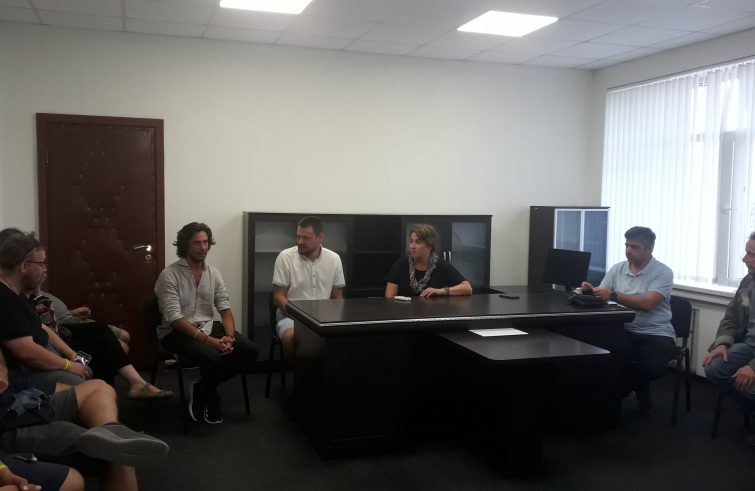 “We ourselves don’t know how to stop this war, but we appreciate your closeness and the fact that you are not abandoning us.” With these words, the head of local council of one of the four districts of the city of Mykolaiv, Ganna Remennikova, welcomed on the second floor of the city building the volunteers of the peace caravan who arrived from Italy with tons of humanitarian aid. Their meeting featured the inauguration of a water desalination unit installed in the city with funds collected by the StopTheWarNow network, representing 175 Italian movements and NGOs. “We represent an institution that is deeply involved in aid distribution, especially to the most vulnerable segments of the population,” said the deputy mayor, “and this effort is made possible thanks to the donations we receive. We have no words to express our gratitude.” In the meeting with the volunteers, Remennikova described the difficulties faced in Mykolaiv, not only in connection with the armed forces, but also in social terms. While fighting is raging at Kherson’s battle front, here in Mykolaiv life has come to a standstill. Business has moved elsewhere. “Many people are in need of help – she said – and therefore our primary goal now is to provide support to the people by attempting to ensure at least basic social services. It is a way to keep their spirits high and give them the strength they need to hold on.”
“We ourselves don’t know how to stop this war, but we appreciate your closeness and the fact that you are not abandoning us.” With these words, the head of local council of one of the four districts of the city of Mykolaiv, Ganna Remennikova, welcomed on the second floor of the city building the volunteers of the peace caravan who arrived from Italy with tons of humanitarian aid. Their meeting featured the inauguration of a water desalination unit installed in the city with funds collected by the StopTheWarNow network, representing 175 Italian movements and NGOs. “We represent an institution that is deeply involved in aid distribution, especially to the most vulnerable segments of the population,” said the deputy mayor, “and this effort is made possible thanks to the donations we receive. We have no words to express our gratitude.” In the meeting with the volunteers, Remennikova described the difficulties faced in Mykolaiv, not only in connection with the armed forces, but also in social terms. While fighting is raging at Kherson’s battle front, here in Mykolaiv life has come to a standstill. Business has moved elsewhere. “Many people are in need of help – she said – and therefore our primary goal now is to provide support to the people by attempting to ensure at least basic social services. It is a way to keep their spirits high and give them the strength they need to hold on.”
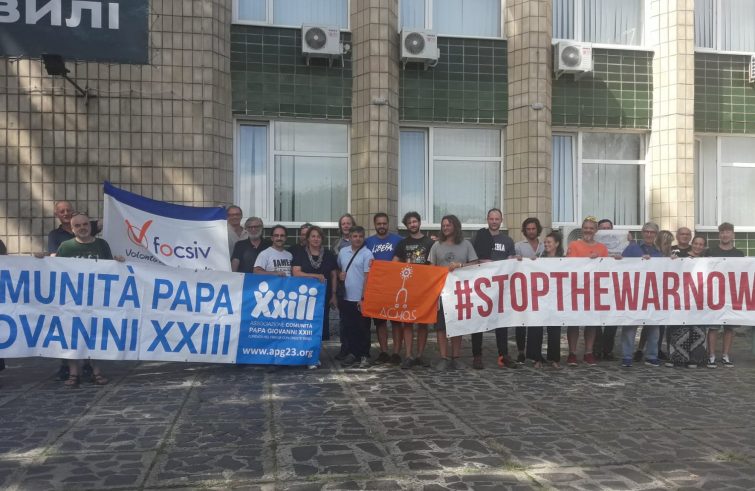 The upcoming winter season is a cause for concern. The local district is already planning to evacuate people living in bombed-out villages. Critical issues include the utter lack of access to clean, drinking water. The Russians attacked and destroyed the local water supply system in the early days of the conflict, so tap water reaching households is contaminated, salty seawater. “We are aware that we could be under massive attack and that the city could be razed to the ground at any moment. However, we also know that our soldiers are fighting on the battlefield and that we will hold out,” remarked the Deputy Mayor. Online school classes resumed September 1st. According to official data, the Russians have killed 379 children in Ukraine, with 735 injured; tens of thousands of children have fled Ukraine. More than 2,400 schools and educational institutions have been destroyed by the Russians. The Deputy Mayor’s thoughts go to the children: “I have a very simple hope for our children: to grow up with no bombings.”
The upcoming winter season is a cause for concern. The local district is already planning to evacuate people living in bombed-out villages. Critical issues include the utter lack of access to clean, drinking water. The Russians attacked and destroyed the local water supply system in the early days of the conflict, so tap water reaching households is contaminated, salty seawater. “We are aware that we could be under massive attack and that the city could be razed to the ground at any moment. However, we also know that our soldiers are fighting on the battlefield and that we will hold out,” remarked the Deputy Mayor. Online school classes resumed September 1st. According to official data, the Russians have killed 379 children in Ukraine, with 735 injured; tens of thousands of children have fled Ukraine. More than 2,400 schools and educational institutions have been destroyed by the Russians. The Deputy Mayor’s thoughts go to the children: “I have a very simple hope for our children: to grow up with no bombings.”








